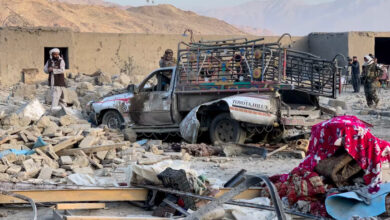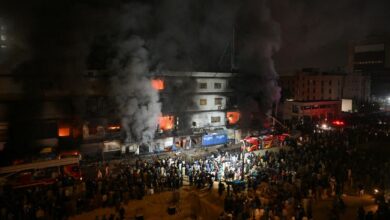Lahore, Pakistan–The death toll from suicide attacks that targeted a busy procession in Pakistan's eastern city of Lahore rose to 31 on Thursday as six people succumbed to their injuries, officials said.
Three suicide bombers targeted a Shia mourning procession made up of thousands of people on Wednesday at the moment of the breaking of the fast in the holy month of Ramadan, wounding hundreds.
It was the first major attack in Pakistan since devastating floods engulfed a fifth of the volatile country over the past month in its worst disaster yet.
"Thirty-one people have died and a total of 281 were injured," Fahim Jehanzeb, a spokesman for Lahore's rescue agency told AFP, adding that he feared more would die from their injuries.
Sajjad Bhutta, a senior local administration official, also confirmed the new death toll.
A mass funeral was hastily arranged for later in the day with police and paramilitary providing tight security, while local authorities announced a day of mourning with all public and private institutions closed.
An AFP reporter said that all markets were closed and the roads were quiet on Thursday, after the attacks provoked an outpouring of fury in the city a night earlier, with mourners trying to torch a nearby police station.
Police fired tear gas to force back the surging crowd as furious mourners beat the bodies of the suicide bombers with sticks and shoes, while others beat their own heads and chests at the site of the attacks in frustration.
The emotional crowd chanted slogans against the police and the provincial government over their failure to protect the Shia procession, an AFP correspondent on the scene said.
Lahore, a city of eight million near Pakistan's border with India, has been increasingly subject to Taliban and al-Qaeda-linked attacks in a nationwide bombing campaign that has killed more than 3,600 people in three years.
The procession hit by the blasts was being held to mark the anniversary of the martyrdom of Hazarat Ali, who is revered by Shia Muslims and is the son-in-law of the Prophet Mohamed.
Shias account for around 20 percent of Pakistan's mostly Sunni Muslim population of 160 million.
Religious violence in Pakistan, mostly between Sunni and Shia groups, has killed more than 4,000 people in the past decade, and it is not the first time Lahore has seen bombers target religious gatherings.
In July, twin suicide attacks on an Islamic shrine in the city, which is the capital of Punjab province and a major military, political and cultural hub, killed 43 people.
The two suicide bombers blew themselves up among crowds of worshippers at the shrine to Sufi saint Data Ganj Bakhsh.
In May, gunmen wearing suicide vests stormed two mosques belonging to the minority Ahmadi sect in Lahore, killing at least 82 people.
Many attribute the wave of Islamist militant attacks in Pakistan over the past three years to Islamabad's alliance with Washington and the US-led war against a resurgent Taliban in neighbouring Afghanistan.
They say the attacks are coordinated by Taliban and al-Qaeda-linked militants living in the remote mountainous areas bordering Afghanistan.
There were no immediate claims of responsibility for the latest attack, which came as the United States added the Pakistani Taliban to a blacklist of foreign terrorist groups, whose members now face asset freezes and travel bans.
US Secretary of State Hillary Clinton designated the Tehreek-e-Taliban as a foreign terrorist organisation on 12 August, and it was formally added to the list when it was published Wednesday in the Federal Register.




